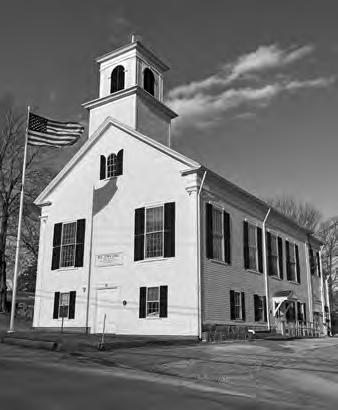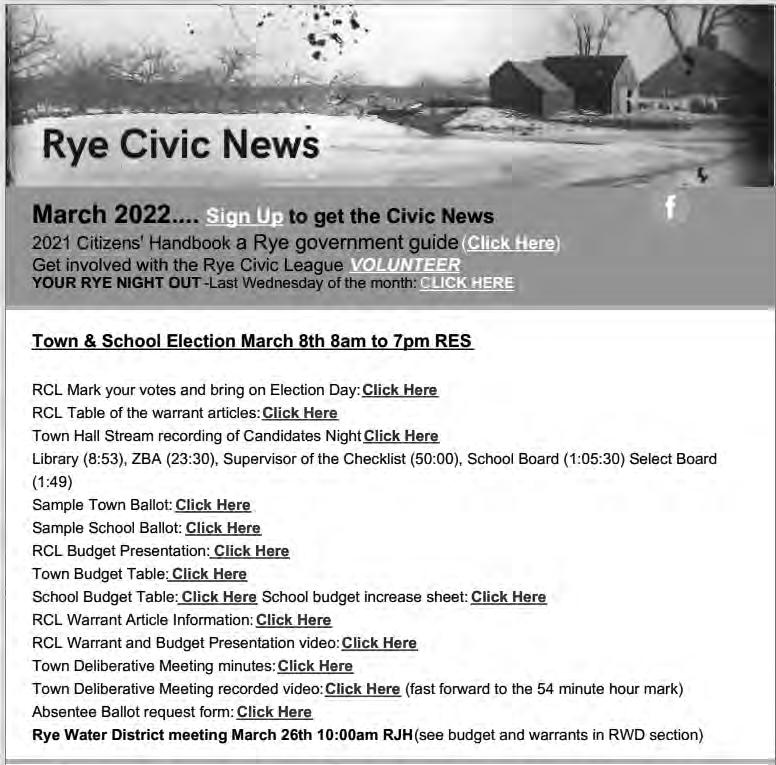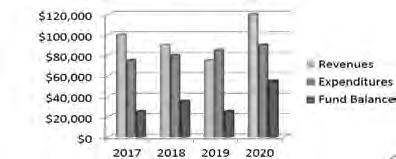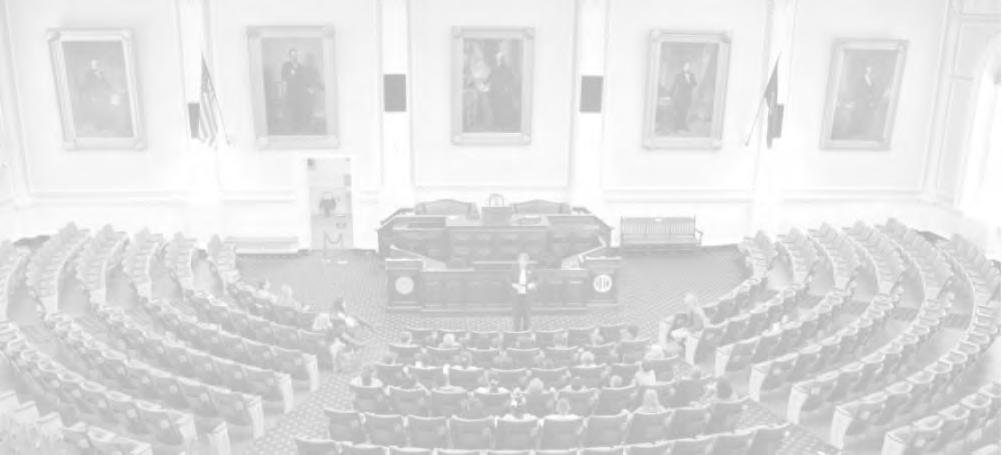
49 minute read
Upcoming Events
For more information or to register for an event, visit our online Calendar of Events at www.nhmunicipal.org. If you have any questions, please contact us at nhmaregistrations@nhmunicipal.org.
JULY
Independence Day (NHMA Offices Closed)
Monday, July 4
NHMA Webinar: MHEC: An Extension of Your Purchasing Department
12:00 noon – 1:00 pm Wednesday, July 27
AUGUST
NHMA Webinar: Funding Essential Community and Municipal Projects - USDA Rural Development, NH
12:00 noon – 1:00 pm Wednesday, August 17
NHMA Board of Director’s Meeting
9:00 am – 11:00 am Friday, August 19
SEPTEMBER
NHMA Board of Director’s Meeting
9:00 am – 11:00 am Friday, September 16
2022 Budget & Finance Hybrid Workshop
9:00 am - 4:00 pm Tuesday, September 20 Derryfield Country Club, Manchester $90 - In-person; $70 - Virtual
NHMA's Legislative Policy Conference
9:00 am - 12:00 pm Friday, September 23 25 Triangle Park Drive, Concord
Please visit NHMA’s website @ www.nhmunicipal.org frequently for the most up-to-date event and training information. Thank you.
Cordell A. Johnston
Attorney at Law Representing towns and cities
P.O. Box 252 Henniker, NH 03242 603-748-4019 cordell@cajohnston.com

Carrying on a Civic Tradition in Rye, New Hampshire
By Alex Herlihy, Vice President, Rye Civic League
Throughout history there are many examples of citizens taking an active role in the governance of their communities. In the Agora of ancient Athens, the marketplace below the Acropolis, residents engaged in lively debate about the issues of the day, exercising their obligation as citizens. The early years of the Roman Republic saw the Senate provide one model for representative government where people felt their views were taken seriously and they had some access to those in power.
In decentralized medieval Europe, communal life and cooperative societies were common. English Common Law and the Magna Charta of the 1100s and 1200s added more foundational principles for building open societies. The early self-government of the Swiss cantons, protected by Swiss neutrality, further enhanced these principles. But it was Enlightenment political philosophers and writers such as John Locke and others who laid the foundation for the revolutionary upheavals of the 1700s and 1800s. The end of colonialism and empire in the 1900s forged more republican forms of government that we see in some parts of the world today.
Colonists in early America took note of the egalitarian decision making of native peoples, a time-honored tradition in many parts of the world. This knowledge and the parish meeting practice they brought from England, led to the creation of the annual New England town meeting, a strong form of early democracy on the local level where citizens and not elites made the decisions. On a daily basis, taverns were civic gathering places for debate and the sharing of ideas. By the 1830s Alexis de Tocqueville noted that collective civic groups were dealing with many challenges in the new nation, an emerging unofficial fourth branch of government, as non-profit organizations are often recognized today. During the twentieth century, many Americans continued to organize locally and nationally to tackle issues on their own, lobby to improve local government performance, promote civic activity and raise public awareness about critical community issues.
History of the Rye Civic League
By the late 1950s and 1960s the modern civil rights movement had forged a crucible of questioning authority and had spawned many other political movements. People paid more attention to local government and volunteered to serve on town boards to meet rising challenges. It was during this decade in Rye, New Hampshire, that full zoning was enacted, and the Conservation Commission, Historic District Commission and Recreation Commission were established. Residents were going to board meetings to contribute their ideas and engage in the challenges of the day. Three of those civic-minded people were Frances Holway, Joan La France and Marjorie Miller.
These three politically active women realized that the average resident did not know what was going on in town since there was no formal town government communication with
Transportation | Water& Wastewater | Solid Waste | Structural
CMA
ENGINEERS
pursue excellence




PORTSMOUTH, NH | MANCHESTER, NH | PORTLAND, ME

the people beyond the annual town report and what they observed at the annual town meeting. In 1968 they established the Rye Civic League (RCL) for the purpose of educating townspeople about Rye town government. The league published a monthly Town News which reported on town board meetings and other issues facing the town. The publication was mailed to paying members and distributed in brightly colored red bags in different locations in town.
The RCL quickly became a catalyst for active citizens and the three founders made a lasting contribution to Rye civic life. Holloway was a go-getter and provided the basement workspace and mimeograph machine. Miller was the main Town News editor and kept it going in the waning years. La France was very knowledgeable about legal affairs as well as the New Hampshire state laws and the “Revised Statutes Annotated” (NH RSA) and was often the most intelligent person in the room during Board of Selectman and Planning Board meetings. In 1992 the RCL disbanded, along with the Town News, due to low membership and lack of volunteers.
From 1998 to 2002 an ad hoc group called the “Concerned Citizens of Rye” organized around certain issues, but the monthly Town News was sorely missed, and citizens were less informed. The lack of such an oversight group was evident when the new safety building (2004) did not get the public scrutiny it deserved. Structural and legal problems with the building ensued and cost the town unnecessary expenses. Upon my retirement in 2009 I paid more attention to town affairs and remembered my time as Town News co-editor. I could see a clear need for more voter education, so I revived the Rye Civic League. The catalyst was a proposed development which had people up in arms, but not well informed about the dates of the town board meetings dealing with it. After a modest beginning, a core of dedicated and skilled residents emerged. By 2011 RCL was editing and publishing a monthly online newsletter, the Rye Civic News.
This newsletter is now emailed to over 1,400 residents (Rye has 4,705 registered voters out of about 5,500 residents). With people so busy and with so many town meetings to pay attention to, this newsletter delivers key points in a digestible format that enables residents to stay informed and become more active in civic life. The Civic News provides links for more detailed information that is posted on RCL’s website, as well as to the town’s website. Over 50 percent of recipients open the Civic News enewsletter each month. 20 percent to 40 percent of those people click on at least one link to get more information with an average of 2 to 3 clicks per person. Leading up to the 2022 town election, the newsletter was opened by 66 percent of recipients. As a result of the civic league’s efforts, voter participation in the town election has increased from a low of 20 percent in 2009 to over 30 percent over the last decade. Much work still needs to be done to increase those numbers to the level of the national election.

RYE, N.H. from page 11
RCL is a 501(c)(3) non-profit organization and cannot advocate for any candidate or ballot measure. It presents unbiased reporting of events including both sides of controversial issues and important questions that are raised which are often not found in official minutes. The Civic News provides more detailed information than any other publication.
The Rye Citizens Handbook has filled a large gap in citizen education. Prior to the RCL creating it in 2013, no document existed to help people understand how small-town government works. The handbook is funded by local businesses and updated by RCL annually. Additional voter education is provided through RCL’s annual public warrant article (individual decisions voters make) presentation and financial analysis of the town and school budgets. While the town provides a year-to-year financial comparison, the RCL analysis covers the past five or ten years. The presentation also includes an analysis of the twenty to forty warrant articles with a condensed table for easy access to facts. As a non-partisan group, the RCL hosts a Candidate’s Night prior to every town election as well as one for statewide elections.
To produce the monthly Civic News, RCL members attend meetings, watch recorded videos or read draft meeting minutes of public meetings, then create the short digestible key points for residents. Links to minutes, recorded videos or to more detail make it easier for voters to learn more. The Civic News leads with the top 10 issues of the previous month for those who will not read “below the fold” of the email newsletter, and in 2021 added a YouTube summary, also shared to various town Facebook groups of those ten issues to make for less reading and a more dynamic experience. RCL intends to continue creating short videos to provide information and insight into issues facing town residents. All these RCL services are provided by volunteers.
RCL has a Board of Directors, an annual meeting and a monthly business meeting followed by an open forum discussion at the public library or at a local restaurant to make meetings more appealing. The open forum meeting provides a place to discuss town issues or get assistance on dealing with town boards. RCL members are well-informed on town zoning ordinances. Civic league members have compiled a large number of bite-sized histories of Rye political events which provide a quick perspective for those researching current issues.
Recently RCL sponsored special forums such as “Challenges Facing Water in Rye” and “History of Housing Developments and the Future of Development in Rye.” In May of 2022 the league will make an interactive presentation on environmental issues facing the town to all the students in the Rye Junior High School. Teachers will be provided with access to all our documents as a follow up to this presentation in hopes there will be some good curriculum integration.
What RCL does with the Civic News is a form of “citizen journalism,” a grassroots movement that is on the rise in the US, making good efforts to fill the gap in local news. See: National Asso-
PROBLEM PROBLEM PROBLEM SOLVING SOLVING PROBLEM SOLVING It’s our strong point It’s our strong point SOLVING It’s our strong point It’s our strong point
civil & environmental engineering civil & environmental engineering www.underwoodengineers.com civil & environmental engineering civil & environmental engineering www.underwoodengineers.com
ciation for Citizen Journalism, www. nacj.us, and following by the late Jack Driscoll, of Rye, New Hampshire. His book, Couch Potatoes Sprout: The Advent of On-line Community Journalism and an article published by the MIT Media lab where he was a resident from 1995- 2008, “The Handbook for Citizen Journalists: Catching the Journalistic Attitude.” Currently, the RCL “Civic News” focuses only on short, objective statements with links to town board meetings only, with no feature articles and no advocacy, but other forms of community journalism do include those features. In the future, RCL may expand its offerings to include analysis and commentary and letters to the editor, just as one used to find in rapidly disappearing daily newspapers. There are many “news deserts” in the country and online journalism can help fill the gap.
Rye Civic League costs are modest and include the website, post office box, state fees to Attorney General and Secretary of State, additional printing of the Rye Citizen’s Handbook, other printing costs and related expenses. The most expensive items are “Constant Contact” for publishing to the distribution list and a PO Box. Recipients of the Civic News are asked to contribute $12 a year ($1 a month) and become “a member.” RCL has found that several members contribute way beyond the $12 minimum.
How to Create a Civic League in Your Community
As in Rye in 1968 or again in 2009, every community has politically active people on the local level. To start a civic league in your town, hold an organizational meeting of people who attend and speak at town board meetings and deliberative sessions, write letters, volunteer in town groups, and be sure there is at least one native or long-time resident in the group to provide perspective and town political history. Share the documents from the Rye Civic League before the meeting by going to www.ryecivicleague. org and clicking on ‘How to Start a Civic League.’
The first gathering must begin with a general discussion and agreement of the need for a civic league. Discuss goals, tasks and obstacles. Early in the process, or before the first newsletter, inform local elected officials and board or commission-members your intent as well as having an article in the local newspaper and on local Facebook and other community forums. A civic league must be a transparent organization and while no such group, or government body for that matter, is ever immune from bias, the league needs to strive to be non-partisan.
The new league should be promoted as a formal membership organization from the outset in order to support overhead such as fees to state government, domain name for web site, PO Box, printing costs, platform server for distribution list monthly newsletter, (Mail Chimp is a free alternative, as Constant Contact costs over $500 per year). If a low membership fee is set, many members will contribute beyond that as an annual donation. Word of mouth, other town organization lists and social media will help grow the new league’s distribution list and gain more members in the process.
The board structure of four officers should be complemented by at least three or more other board members, each with a responsibility to head up and seek volunteers for support on those efforts. There needs to be a critical mass of people, (board, volunteers, members) who are “in the loop” on league efforts as well as town issues. Once organized, do not wait to apply for IRS “501 (c)(3)” non- profit status. There is someone in all communities who can help with this process.
The skills needed for the league to be successful are clear: editing and publishing the newsletter, note-taking at board meetings, social media, film segments for newsletter and building and maintaining the web site. All volunteers must become familiar with how local boards operate as well as the existing zoning ordinances. Creating a citizen’s handbook is a good first step
Sansoucy Associates
Providing Utility and other Special Purpose Property, USPAP Compliant Valuations and Assessment Reports for Generation, Transmission and Distribution of Electric, Gas, Water, Oil, Telecommunications, Cable TV, Wireless, and all Forms of Renewable Energy. Regulatory, Policy, Expert Witness, and Eminent Domain Consulting. Offices in Lancaster, NH and Fountain Inn, SC.
Phone: (603) 788-4000 Website: Sansoucy.com Email: gsansoucy@sansoucy.com
We have all the tools to meet your needs.
Drummond Woodsum’s attorneys are experienced at guiding towns, cities, counties and local governments through a variety of issues including:
• Municipal bonds and public finance • Land use planning, zoning and enforcement • Ordinance drafting • Tax abatement • General municipal matters • Municipal employment and labor matters • Litigation and appeals
We use a team approach – small groups of highly specialized attorneys that work together to offer clients the counsel and support they need, precisely when they need it. It’s an efficient way to practice law. It’s also extremely productive and cost effective for our clients.
Learn more about what our municipal group can do for you: dwmlaw.com | 800.727.1941

RYE, N.H. from page 13
and a very visible contribution for the new league. Good public relations on all levels are necessary, especially at all public gatherings where information on the league may be distributed and questions answered.
Cities can adapt and create civic leagues for different neighborhoods to focus on local issues as well as those more city or county wide. Communities with strong county governments will also benefit from a league by reporting on both county and town council actions. The specific actions of the Rye Civic League provide a foundation by which any community can adapt a league to suit their needs.
Finally, it is important to become educated about the political history of your community through annual town and city reports, historic newspaper archives and interviewing long-time residents. Become informed about current challenges facing the town such as environmental issues, housing, schools, over- development, enforcement of zoning ordinances, effectiveness of town boards, hiring practices of local government, etc.
Based on the Rye experience, the benefits of a civic league are self-evident, the most important being that citizens will have free monthly access to comprehensive information on local government. That can be transformative for any community.
Final Thoughts
During the late twentieth century, interest in local civic affairs began to wane in favor of following national political ideologies and personalities associated with them. Partisan divides began influencing local issues. This shift was a great loss for local democracy because prior to that time, people in New England and beyond were engaged in direct democracy through annual town meeting debate and elections as well as public hearings and city council meetings and running for these public offices. People were more active in influencing decisions that impacted residents.
There are grassroots civic organizations in most communities that are often driven by one issue such as a controversial development proposal or controlling taxes. The last such single-issue group in Rye was a wellorganized “Save Rye Harbor” group in 2010 that opposed a housing development, but it disbanded after the development was approved. Few other groups in the country do what the Rye Civic League does - providing monthly, comprehensive coverage of town government through a free newsletter. The survival of democracy at the local level needs this kind of civic league, especially because daily newspapers
MUNICIPAL ENGINEERING
Supporting NH Municipalities Since 1962 TRANSPORTATION
Roads, Bridges, Sidewalks, Traffic, Airports SITE DEVELOPMENT
Civil/Site, Stormwater, Survey, Permitting NATURAL RESOURCES
Wetlands, Dams, River Restoration WATER/WASTEWATER
Collection, Treatment, Storage, Distribution FACILITIES
Mechanical, Electrical, and Structural Engineering
Bedford
603-637-1043
Laconia
603-524-1166
www.dubois-king.com
and especially radio stations have been gutted of local news.
The RCL will soon try to help a neighboring town to start a league. Its model could be disseminated in the United States via a grant or other means. The Rye Civic League has a 35-year history of living up to the public obligation of those Greek citizens 2500 years ago, debating and influencing decisions in the shadow of the Acropolis.
Alex Herlihy is a native of Rye, New Hampshire, a retired high school history teacher and former co-editor of the Town News of the original Rye Civic League. He revived the league in 2009 and currently serves as its vice president.
Article reprinted with permission from the National Civic League whose mission is to advance civic engagement to create equitable, thriving communities.

certified public accountants
experience counts
We know New Hampshire governments. Your needs come first at Vachon Clukay & Company, PC, so we’ve structured ourselves to fulfill all of your service needs. We provide the following services:
Auditing Accounting Support and Training Advising Personalized “Team” Service Expertise in How Your Organization Operates Computerized Forms Operational Management Studies
We want to be part of your team. We want to be part of your team.
For personal attention contact: For personal attention contact: Robert L. Vachon, CPA Jarad Vartanian, CPA
608 Chestnut St. • Manchester, NH 03104 Phone: (603) 622-7070 Fax: (603) 622-1452 www.vachonclukay.com
Taking the Mystery Out of Fund Balance
By Katherine Heck, Government Finance Advisor
Municipal officials are often asked to explain to constituents the mystery around unreserved fund balance. Questions abound surrounding this complex topic, especially during the development of the budget and the annual meeting process. To assist the electorate in understanding unreserved fund balance, this article will explain the function of fund balance in government while keeping the citizen perspective in mind.
The average constituent might think of fund balance within the context of a regular checking account, but governmental finances do not operate like personal spending accounts. The term “fund balance” is one that is frequently used in governmental financial reporting to indicate a positive or negative change to a municipality’s fiscal position; however, a fund balance is not the same thing as keeping cash in a checking account.
Why isn’t all fund balance returned to the taxpayers at year end by using it to lower the tax rate?
What is Fund Balance?
In government accounting, fund balance is the difference between assets and liabilities resulting in a surplus or a deficit. A common misconception is that fund balance is a cash account, associated with or correlated to a government’s bank account balance. But unlike a personal bank account, a general fund balance is not a “cash-account;” it is a measure of equity between revenues and expenditures. Government fund accounting is unique to the public sector (i.e. cities, towns, schools) and requires separate self-balancing accounting entries to track each fund’s revenues and expenditures. In the private sector it would be defined as a company’s working capital, but in public sector, it is referred to as fund balance. In government finance, the retention and use of unassigned fund balance assists in measuring the financial health of an individual fund, such as the general fund.
Fund balance is sometimes misunderstood and criticized as an unnecessary accumulation of money that could be used to lower taxes and fees. A municipality’s ability to use unassigned fund balance can be seen as a driving factor behind maintaining stable tax rates. As a financial tool, the main objective of establishing and maintaining fund balance reserves is to create a strong fiscal position that will allow a local government to weather negative economic trends and unforeseen circumstances. Essentially, maintaining the appropriate level of fund balance will mitigate current and future risk and to ensure a stable cash flow.
What is the relationship between the annual budget, fund balance and cash flow?
Fund Balance is the total accumulation of operating surpluses and deficits since the beginning of a local government’s existence. Budgets serve a different purpose in a government than they do in a private sector business. In a business, the budget is a plan to shoot for—often an aggressive plan that a business may or may not be likely to achieve. In the public sector, a local government creates a comprehensive plan to provide a desired level of services defined by local priorities through the budget process. In other words, a local government
The Fund Balance Formula: Fund Balance = Assets – Liabilities budget is a statement of policy and values. In a government, the expenditure side of the budget is called “appropriations,” and it is the legal authority for the governing body to provide a given level of service granted by the legislative body. The revenue side is the income a local government needs to pay for all of the services it provides. The major sources of revenue for a municipality include taxes, service charges, and fees. These revenue sources help a municipality gain financial stability, broaden the tax base, and expand the types of activities and services available; they are
Year Operating Surplus / Deficit Revenue
The difference between a unit’s revenues and expenditures for a fiscal year. ExpensesEnd
Total Fund Balance
Revenues – Expenditures =Operating Surplus / (Deficit)
Fund Balance is the total accumulation of operating surpluses and $0 deficits since the beginning of a local government’s existence. 2018 2019 2021 2022

The Fund Balance Formula:
Fund Balance = Assets – Liabilities Operating Surplus / Deficit
The difference between a unit’s revenues and expenditures for a fiscal year.
Revenues – Expenditures =Operating Surplus / (Deficit)
also largely independent of state and federal funds. Taking the Most municipalities depend on revenues collected during a single period, despite having consistent, year-round expenses.
Adequate fund balance allows local officials to maintain a stable set of public services throughout an entire budget cycle because a typical municipal cash flow cycle will have cash on hand amounts decreasing as the June and December tax collection approach. Unlike a business, municipalities do not have the ability to raise additional revenues during the fiscal year. A local government relies on drawing down existing fund balance (excess capital) to ensure adequate cash on hand is available to meet expenses before collections arrive.
Understanding that the natural revenue cycle within a local government is directly tied to fund balance reserves allows for the prudent management of financial resources throughout the year. When cash flow is under stress, a municipality may issue short term debt to cover the gap, requiring an interest cost to maintain steady operations and introducing risk. Adequate fund balance negates that need, saving resources that would otherwise be spent on servicing the cost of that debt. A strong fund balance will allow the municipality to meet cash flow needs, complete scheduled projects, and provide a contingency in the case of an emergency or disruption in revenues. Fund balance also has credit rating implications. According to the published local government rating methodology from Moody’s Investors Service, “a fund balance between 15% and 30% of revenues is needed to receive a scorecard value of “Aa.” This supports the importance of each municipality adopting a policy that reflects a strong fund balance approach to meet both short-term and long-term financial goals.
How much fund balance should a local government retain?
There is no single answer to this question, as each municipality should analyze its own unique circumstances to determine the appropriate level of fund balance to retain. Some concepts and best practices to consider have been developed by the Government Finance Officer’s Association (GFOA).
Let’s begin by stating that zero is not an advisable option. Every government entity requires some level of fund balance for cash flow purposes and for responses to emergencies. There is an appropriate range of fund balance because it is possible to have too little, but it is also possible to have too much. Key factors to consider when establishing an appropriate level of unreserved fund balance include:
Considering a policy that targets an amount equal to two months of operating expenses, including debt service obligations.
Generally, the GFOA recommends a range of 5% to 15%, regardless of the size of the municipality.
The New Hampshire Department of Revenue Administration (DRA) recommends 5%-17%. The higher percentage takes into account that New
$3,500,000.00
$3,500,000.00
$3,000,000.00 $3,000,000.00
$2,500,000.00 $2,500,000.00
$2,000,000.00 $2,000,000.00
$1,500,000.00 $1,500,000.00 Healthy Municipal Budget CycleFund Balance Covers Expenses Healthy Municipal Budget CycleFund Balance Covers Expenses
Strong Begining Fund BalanceStrong Begining Fund Balance Fund Balance and cash are stressed but still positiveFund Balance and cash are stressed but still positive
$1,000,000.00 $1,000,000.00
$500,000.00 $500,000.00
$ 0
$- $ 0
Jan-21 Feb-21 Mar-21 Apr-21 May-21 Jun-21 Jul-21 Aug-21 Sep-21 Oct-21 Nov-21 Dec-21
Jan-21 Feb-21 Mar-21 Apr-21 May-21 Jun-21 Jul-21 Aug-21 Sep-21 Oct-21 Nov-21 Dec-21 Revenue Revenue Expenditures Expenditures Cash Flow Cash Flow Fund Balance Fund Balance
Strained Municipal Budget CycleStrained Municipal Budget CycleExpenditures Exceed Fund Balance Expenditures Exceed Fund Balance
Weaker Begining Fund Balance Weaker Begining Fund Balance
Ecomomic strees or unforseen Ecomomic strees or unforseen circumstances results in negative fund circumstances results in negative fund balance and cash flow constraints balance and cash flow constraints
Jan-21 Feb-21 Mar-21 Apr-21 May-21 Jun-21 Jul-21 Aug-21 Sep-21 Oct-21 Nov-21 Dec-21
Jan-21 Feb-21 Mar-21 Revenue Apr-21 May-21 Jun-21 Jul-21 Expenditures Aug-21 Sep-21 Fund Balance Oct-21 Nov-21 Dec-21 Cash Flow Revenue Expenditures Fund Balance Cash Flow
Hampshire is one of the most heavily reliant states on property tax as revenue for the operation cities, towns, schools, and counties.
Determining and maintaining appropriate fund balance levels requires regular analysis and monitoring. In light of economic trends, risk tolerance, or emergencies that impact a municipality, levels of unassigned fund balance may need to be adjusted as a budget grows and new debt service obligations are issued. Some elements to consider might be a historical review of the timing of how revenues are received, and expenditures are paid. Also consider the impact of revenue and expenditure patterns on cash flow and peak cash flow needs over most recent years. Determine the available cash needed for emergencies during peak cash flow needs and perform an assessment of the municipality’s risks which could occur simultaneous with peak cash flow needs. There are several different subcategories when it comes to fund balance, and this article focuses on the unassigned fund balance, which are available reserve funds that can be used or spent in the upcoming budget year. The governing body may appropriate any amount of the undesignated fund balance in excess of the designated retained percentage to offset property taxes as part of the final adopted budget for a fiscal year. In addition, excess funds may also be used for capital improvement projects, equipment replacement, and other similar budgetary needs, but these actions may require legislative body approval.
A policy should be developed which clearly states when fund balance reserves will be used, how they should be used, how the reserves will be replenished (and how quickly), and what happens when fund balance or reserves drop below the designated levels. Defining these conditions and triggers will help minimize misinterpretations associated with the use of fund balance.
In conclusion, defining fund balance uses and limits for your municipality within the scope of a policy ensures a balance exists between collecting more taxes than are necessary while still allowing for the prudent accumulation of funds. A municipality will be well served by maintaining a reasonable fund balance. This financial tool will help to bridge cash flow, avoid interest costs from short-term borrowing, preserve credit ratings, and provide a buffer against revenue shortfalls or expenditure overruns.
Katherine Heck is the Government Finance Officer for the New Hampshire Municipal Association. Katherine can be reached by telephone at 603.224.7447 or via email at kheck@nhmunicipal.org.
Resources: 1. “Rating Methodology: US Local Government
General Obligation Debt,” Moody’s Investors
Service. September 27, 2019. p.13. 2. “Fund Balance Guidelines for the General Fund”
Government Finance Officers Association. www. gfoa.org/ fund-balance-guidelines-general-fund
We represent towns and ci�es throughout the state and bring value to our clients through decades of experience and adhering to the budgetary constraints under which municipali�es operate. We emphasize preven�ve and �mely legal counsel to our clients with a view toward avoiding problems that result in li�ga�on.
Special counsel services include:
Telecommunica�ons Appellate Water U�lity & Infrastructure Tax Assessment Labor & Employment Growth Control Police Eminent Domain Li�ga�on Land Use & Planning Environmental
Also available for conict counsel services
OFFICES IN EXETER, PORTSMOUTH, MEREDITH & CONCORD, NEW HAMPSHIRE
WWW.DTCLAWYERS.COM DONAHUE, TUCKER & CIANDELLA, PLLC
E‐mail: info@DTCLawyers.com Toll Free: (800) 566‐0506 For inquiries please contact Christopher Boldt or Sharon Somers
Pursuing Racial Equity Through Intentional Community Engagement
By Haruka Margaret Braun, Intern NLC REAL Team
One year after George Floyd’s murder sparked a national conversation about policing and race and millions worldwide to march in the streets in opposition to police violence, local leaders have responded. In the last year, the National League of Cities have helped local elected officials and their communities to pursue anti-racist policies and programs not only on public safety but in several policy areas.
For Black residents across the country, the conviction of Derek Chauvin was a too rare occurrence but an encouraging sign of accountability. However, many hesitated to call it justice. George Floyd did not deserve to die. Black, Latinx, Indigenous, Asian American, Pacific Islander and other residents of color continue to be failed by the very institutions tasked with protecting them. It is clear there is still more work to be done.
And that work is already happening. Communities across the country have initiated difficult but necessary conversations about racism and inequity particularly for their Black and brown residents. The COVID-19 pandemic shined a light on severe racial disparities and tensions across the nation, and the reality of the present-day implications of institutional and structural racism.
Black and brown communities were overrepresented in COVID-19 infections, hospitalizations, and deaths. Black Americans were 2.8 times more likely to be hospitalized with COVID-19, and were 1.9 times more likely to die from the virus according to CDC data updated through April 23rd We also continue to see lower COVID-19 vaccine rates. A study published by the Centers for Disease Control and Prevention’s National Center for Health Statistics found that life expectancy in Black populations declined the most in 2019, now at 72 years with a decline of 2.7 years. It is now at its lowest since 2001. These communities also suffer the most from the economic fallout of the pandemic. These harsh disparities have been exacerbated in other racial communities, as well. Prior to the pandemic, Indigenous people were already one of the most disadvantaged communities in the United States. During the pandemic, many Indigenous groups were left to fend for themselves to set up COVID-19 testing, secure supplies, and plan their economic recovery. Many communities also saw a rise in anti-Asian hate and attacks against Asian American and Pacific Islanders pointing to a worrying trend around xenophobia and racism for people of color. Successfully dismantling structural and institutional racism to create equitable, safe, and healthy communities will not happen overnight. It requires that local leaders actively implement anti-racist policy and ensure that such policies are supported by long-term and sustainable practices, values, and norms. Those elected to serve in leadership roles must actively, bravely, and intentionally choose every day to honor the legacy of Mr. Floyd’s life by critically reflecting on the history of racism in their communities and engaging directly with community members to begin and sustain the process of racial healing.
NLC has developed a framework to guide local leaders’ commitment to anti-racist policies and to prioritize racial equity, ensuring the safety and wellbeing of residents and businesses.

Normalize
Normalizing conversations around racism and promoting racial equity is the first step toward putting your community on a path to racial healing. Many community members have not been offered spaces for the acknowledgement of the role local governments have played in past policies and practices that perpetuate racial disparities. Local leaders can be key in creating these spaces as safe and open for discussing both historical accounts and present-day forms of racism in the community. . It is crucial that these conversations center the voices of those most impacted and include individuals who have historically not been invited to the decision-mak-
ing table or part of the decision-making process. Municipalities are unique in their position to create space for community healing.
In Rhode Island, Mayor Jorge Elorza released the report, A Matter of Truth: The Struggle for African Heritage and Indigenous People Equal Rights in Providence, Rhode Island (16202020), this past March, detailing the centuries of systemic inequities faced by Black, Indigenous and residents of color in Providence, RI. Created in partnership with community groups, this report highlighted the historical and present ways racism has shaped employment, policing, housing, urban development, education, and tribal sovereignty. By investigating and acknowledging the depth of the history of racial injustice and racial tensions in Providence, the city has taken a step forward in bringing communities members together on a path of racial healing.
Organize
Once open community spaces for discussions on racial equity are created, leaders must work hand in hand with community members and activists to organize and implement policies that move towards racial equity. Often, this requests a different approach that centers those most impacted and vulnerable. This approach encourages elected officials to uplift and empower community leaders who already doing the work on the ground. Crucial in this process is asking the question: who is sitting at the decision-making table? Ensuring the inclusion of individuals who represent communities that have historically been left behind by government is imperative.
The City Council in Arlington, TX created the Unity Council in June 2020 to gather community input regarding measures to build racial equity and promote racial healing in their communities. Made up of 15 members of the city’s Community Relations Committee and 15 additional members appointed by the City Council and Mayor, the Unity Council relies on active engagement from community leaders. The council was tasked with gathering community input on improvements to equity strategies and policies and presented a report of recommendations and findings. By uplifting and empowering the voices of those most impacted and creating spaces for relationship-building, Arlington took an intentional step toward healing racial divides in their communities.

Operationalize
To create long-term and sustainable solutions that support racial equity, anti-racist policies and practices, new norms and values must be operationalized within a community. This translates to creating and supporting institutions and operations to ensure that commitment to racial equity becomes action. Operationalizing racial equity can and should take many forms.
For example, collecting disaggregated data and creating measurable outcomes for racial equity goals is key to measuring progress and creating accountability. Many cities have created a dedicated team and/or office to focus on l anti-racism work. Across the nation, municipalities have hired and created chief equity officer roles. Ensuring that every municipal staff member, regardless of title, has a specified a role in diversity, equity, and inclusion (DEI) work becomes a clear determinant to a city’s commitment to racial equity goals. It is critically important that the city publicly demonstrates a collective and unified approach to racial healing.
In San Francisco, CA the Office of Racial Equity (ORE) was created in 2019 as a division of the Human Rights Commission. ORE serves as the city’s dedicated department to support the city’s racial equity goals and outcomes and requires that every city department designate employees as racial equity leaders acting as liaisons to the office. The office released the June 2020 Progress Report detailing the authority the office holds, as well as action steps taken since the creation of the office.
Looking to the Future
Creating equitable communities that act as spaces for every person to thrive requires us to engage critically with the historical and present-day accounts of racism in our own communities.
As local leaders strive to reimagine government policies, procedures, and processes to build more equitable communities, NLC’s Race, Equity, and Leadership (REAL) team is available to help cities and towns learn the impact of historical inequities, equip leaders to have the tools necessary to have community-centered conversations, and design programs that dismantle structural and institutional racism.
Local leaders have shown their courage at answering the calls for racial justice and being intentional with racial equity commitments to community members. The work is just beginning.
Haruka Margaret Braun is an Intern on NLC’s Race, Equity and Leadership (REAL) team.

By Stephen C. Buckley, Legal Services Counsel
Three recent decisions by the U.S Supreme Court address local government operations that touch on the freedom of speech protected by the First Amendment.
Houston Community College v. Wilson
In Houston Community College v. Wilson, the Court was asked to determine whether the verbal censure of David Wilson, a member of the Board of Trustees of the Houston Community College System, was an impermissible retaliation for exercising his freedom of speech denouncing actions of the Board of Trustees. The Court reiterated the general rule that the First Amendment prohibits government from subjecting individuals to retaliatory actions after the fact for having engaged in protected speech. A plaintiff pursuing a First Amendment retaliation claim must show that the government took an adverse action in response to her speech that would not have been taken absent the retaliatory motive.
In Mr. Wilson’s case the only element of his censure by his fellow trustees before the Court was their verbal statement that his conduct was not consistent with the best interests of the College. The Court concluded that the verbal censure did not prevent Mr. Wilson from doing his job, and it did not deny him any privilege of office, and even Wilson acknowledged the censure was not defamatory. Considering those circumstances, the Board’s censure did not materially deter Mr. Wilson from exercising his own right to speak, and therefore did not offend the First Amendment. Of note was the following statement in the decision about the freedom of speech and public service by elected representatives:
In this country, we expect elected representatives to shoulder a degree of criticism about their public service from their constituents and their peers—and to continue exercising their free speech rights when the criticism comes. As this Court has put it, whatever differences may exist about interpretations of the First Amendment, there is practically universal agreement that it was adopted in part to protect the free discussion of governmental affairs. When individuals consent to be a candidate for a public office conferred by the election of the people, they necessarily put their character in issue, so far as it may respect their fitness and qualifications for the office.
(citations & quotation marks omitted).
Key Takeaway: Public bodies can censure fellow board members for conduct that is detrimental to the best interests of the public body, and such verbal censures would not violate the First Amendment, provided the censure did not deny a privilege of office, and did not prevent the censured member from doing their job as an elected or appointed official.

City of Austin v. Reagan National
In City of Austin v. Reagan National the Court addressed an issue left unresolved from its decision in Reed v. Town of Gilbert and the regulation of off-premise signs.
Two outdoor advertising companies challenged a provision of the City of Austin sign code that prohibited changes to a grandfathered billboard because it was an off-premise sign. The City had modified its sign code to define an off-premise sign to mean “a sign advertising a business, person, activity, goods, products, or services not located on the site where the sign is installed.” The City Code prohibited the construction of any new off-premise signs, but allowed pre-existing off-premise signs to remain as grandfathered uses. However, grandfathered signs could not be modified to change the method or technology used to convey a message. When
Key Takeaway: Municipalities can adopt sign codes that impose more stringent regulations or prohibitions for off-premise signs as opposed to on-premise signs. A sign code can define an off-premise sign as one advertising a business, person, activity, goods, products, or services not located on the site where the sign is installed. A sign code that bans off premise signs should provide protection for pre-existing, nonconforming off-premise signs under RSA 674:19.
Key Takeaway: Municipalities can adopt policies that controls the content of signs and flags that are displayed at government venues. First, a written policy should be developed that makes clear that the government venue is not intended to serve as a forum of free expression by the public, rather any sign or flag displayed is an expression of the sentiments of local government. Thus, where signs are allowed to be displayed on municipal property, those signs could be limited to community non-profit organizations that are promoting civic events. Similarly, if flags are allowed to be flown on a municipal flag pole, a list of approved flags could be provided.
Reagan National Advertising of Austin sought to digitize some of its grandfathered, off-premise billboards the City denied those applications. Reagan National filed suit claiming the code’s prohibition on digitizing off-premise signs but not on-premise signs violated the First Amendment.
The Supreme Court had to resolve whether the Austin sign code provision was content neutral in its application to the Reagan National billboard. Under prior First Amendment rulings, anytime a sign code requires the government to read and interpret the content of a sign, a much more stringent level of legal scrutiny applies that renders the sign code provision unconstitutional. Reed v. Town of Gilbert, 576 U.S. 155 (2015). However, in this instance the Court concluded that the challenged sign code only requires reading a billboard to determine whether it directs the reader to the property on which it stands or to some other, offsite location. Since the Austin sign code did not discriminate based on the topic discussed or the idea or message expressed it did not trigger a level of legal scrutiny that would have voided the regulation. Instead, the Court applied intermediate scrutiny and thereby ruled the Austin sign was facially content neutral and was thus constitutional on that basis.
Shurtleff v. City of Boston
In Shurtleff v. City of Boston the Court has defined the difference between unconstitutional viewpoint discrimination and permissible control of the content of speech when government speaks for itself. For many years the City of Boston allowed private groups to raise a flag of their choosing at a flagpole near the entrance of Boston City Hall. This was permitted when a private group was hosting an event or other commemoration in the City Hall Plaza. The City did not have a written policy limiting the use of the flagpole based on the content of the flag. In 2017 Camp Constitution sought permission to raise the Christian Flag (a red cross on a blue field against a white background) to commemorate the civic and social contributions of the Christian community. The City denied the request based on the concern that flying the flag would violate the Establishment of Religion clause of the First Amendment.
When government wishes to state an opinion, to speak for the community, to formulate policies, or to implement programs, it can choose what to say and what not to say. Thus, local government can select what points of view it wishes to promote and not run afoul of the First Amendment. However, when government does not speak for itself it may not exclude speech as that constitutes impermissible viewpoint discrimination.
Examining the private flag flying history at Boston City Hall Plaza, and whether the public would view that activity as government speech, the Court concluded that the lack of any effort by the City to control and shape the messages meant this was not government speech but instead exclusion of a religious viewpoint in violation of the First Amendment. The Court did cite with approval a City of San Jose written policy that city flag poles are not intended to serve as a forum of free expression by the public and provided a list of approved flags that may be flown as an expression of the City’s official sentiments.

Stephen Buckley is Legal Services Counsel for the New Hampshire Municipal Association. He may be contacted at 603.224.7447 or at legalinquiries@nhmunicipal.org.
State House Report
A Very Good Year Legislatively

By Natch Greyes, Government Affairs Counsel
In January, our greenhorn of a team was looking at the legislative term with some amount of trepidation, but the sky didn’t fall, and we approached the session the same way that you’d eat any elephant – one bite at a time. As it turns out, it was a very good year for municipalities. Despite not being a budget year, funding municipal interests turned out to be a top priority, particularly for the Senate, with approximately $100 million in direct payments coming to municipalities. Meanwhile, few of the bills that we opposed ended up on the governor’s desk.
Looking back now at the legislative preview, some of the bills that we thought would be big fights – hand counting ballots (e.g. HB 1064) for instance – weren’t whereas others that we thought just made sense, such as funding municipal wastewater projects (HB 398) were bigger lifts than expected. It really boiled down to education. HB 398 was a bigger challenge because it wasn’t well-known among legislators that ARPA funding was not available for projects substantially completed prior to March 3, 2020, which included those wastewater projects. In contrast, the members of the committee that considered HB 1064 was already well-informed about election processes and could easily see the negative, real-world effects of requiring hand-counting. The groundwork for defeating that bill was laid not only in the experience of those representatives, but the years of testimony and other outreach that those interested in elections – including many local officials – had previously done with members of that committee. And, so, the challenge with HB 398 wasn’t so much overt opposition as fixing a misunderstanding about the availability of federal dollars for these particular projects.
The contrast between the two bills illustrates the importance of local officials raising their voices on matters of local concern and inviting members of the legislature to learn about municipal processes. As we’ve said previously, we know from long experience that the best way to get legislators to understand the effects of policies is to get them to hear from our members. As with the ballot counting issue, that education isn’t something easily compressed into a 5-minute speech to a committee. It’s something that is, to use a phrase, a hands-on thing. Better done at the local level. perience has taught our government affairs team how important it is to do all we can to empower our members to better engage with their legislators. So, this year, instead of simply doing our traditional legislative update at our annual conference, we’re also planning on conducting a Legislative Advocacy 101 program. In that program, we hope to teach local officials the basics of how things work in Concord. It’ll be a bit like NHMA’s popular spring program for new local officials, and hopefully as engaging as your fourthgrade tour of the state house. Be on the lookout for more information about that program in the schedule for our conference, which is taking place this year on November 16 and 17.
Other changes will be forthcoming as well. We are looking at revamping the bulletin to make it more responsive to our member’s needs. Regular readers have already seen one change – the inclusion of a regular feature in the bulletin before a session to remind members of NHMA’s position on bills to help them in their discussions with their legislators. We are also exploring how to make our positions on bills more accessible and available earlier than simply publishing them a week-inadvance in the bulletin. We know that our members are interested in different subjects, catch their legislators irregularly throughout the session, and want to be sure to prioritize their discussions based on what is important to them. We hope to have a solution in time for next year’s legislative session.

Looking back at our legislative preview article (January/February, 2022 issue), there are some subjects left undone. Remote meetings, for example, saw three bills filed – HB 1014, SB 322 & SB 384 – and killed this year. Despite valiant efforts on the part of legislators to reach a compromise, we were informed that it remained just out of reach for this year. Discussions, however, have already begun to try to reach a compromise next year. The outreach and education that our members have engaged in over the past several years has been incredibly beneficial as we have engaged in those initial meetings.
Similarly, other legislation, such as HB 1134, establishing a committee to study proper labeling and disposal of disposable wipes, will likely lead to future legislation as well. Representatives from municipal wastewater facilities and, especially, the Department of Environmental Services, demonstrated the importance of cleaning up this issue.
Speaking of cleaning, late in the session, the Senate amended HB 1547 to add $25 million to the existing perfluorinated chemical (PFAS) remediation loan fund. That fund is already being used by municipalities throughout the state to help clean public drinking water of PFAS contamination, and we know that the infusion of additional cash will be much appreciated. In related news, we also learned that work is in progress to dedicate a further sum, approximately, $200 million to the PFAS problem, but details on that are still being worked out.
Overall, it was a very good year for municipalities legislatively. In a non-budget year, we helped secure more than $130 million for municipalities. Our prior record, as far as our staff is aware, was $50 million in 2020 for the setup of the PFAS remediation loan fund. Meanwhile, municipal attorneys can continue to provide legal advice without fear of it being disclosed thanks to the demise of HB 1073, short-term rental mandates are off the table (for this year at least) with the defeat of SB 249, health officers can continue to fight pests and pestilence thanks to the eradication of HB 1272, and city councils can continue to solve local problems due to the double-drubbing of HB 1268.
We are looking forward to coming back to the legislature next year. We survived the year (and defeated HB 1033, the anti-lobbying bill), and laid the first course of bricks in our relationships with legislators and the general court staff. With your continued help and guidance, we are confident that this foundation will help us build a stronger, more engaged NHMA that will be able to respond more nimbly to an increasingly dynamic and unpredictable world. Already we know that housing is going to be a big issue next session. Even though parts of the governor’s housing bill, SB 400, were eventually included in unrelated-HB 1661, the housing shortage issue isn’t going away before next session. We’ve already committed to working with partner organizations to find solutions that enable municipalities to find innovative ways to ensure an adequate supply of housing, and we are looking forward to having a seat at the table as those discussions continue.
What other issues await us next January cannot easily be predicted. While inflation and supply shortages will certainly continue to loom-large, we don’t yet know what, if any, federal efforts will be undertaken or what fruit those efforts may yield. We do know, however, that something unexpected is likely to occur, and whatever it is, we are here to work for and with you to tackle it. We look forward to hearing from you over the summer and fall and working with you as you work with your local legislators to design legislation that will help your community move forward.
Natch Greyes is the Government Affairs Counsel with the New Hampshire Municipal Association. He may be contacted at 603.224.7447 or at governmentaffairs@nhmunicipal.org.



2023-2024 Legislative Policy Process 2023-2024 Legislative Policy Process Update
FLOOR POLICIES DUE: August 12 POLICY CONFERENCE: September 23
NHMA’s legislative policy process is moving forward! Members received by regular mail in early June the links to the proposed 2023-2024 Legislative Policy Positions and Legislative Principles, as recommended by NHMA’s three policy committees. NHMA members will have an opportunity to vote on these proposals at the Legislative Policy Conference on September 23. We urge each municipality’s governing body, prior to the Legislative Policy Conference, to
vote a position on the recommendations and floor proposals (see below) to provide direction to your voting
delegate at the conference.Otherwise, your delegate is free to cast your municipality’s vote as he or she chooses. In addition, any municipality with an interest in proposing an additional policy may do so through the floor policy process, described below. We will be providing a copy of those floor policy proposals to members in advance of the policy conference.
NOTE: Please do not send your governing body’s vote results or positions to NHMA. Your governing body’s discussions and votes are only for the direction of your voting delegate. The only way a municipality may vote on these policies is to send a voting delegate to the policy conference on September 23.
NOTE: Please do not send your governing body’s vote results or positions to NHMA. Your governing body’s discussions and votes are only for the direction of your voting delegate. The only way a municipality may vote on these policies is to send a voting delegate to the policy conference on September 23.
Floor Proposals - August 12, 2022
The deadline for submitting floor proposals is Friday, August 12. A floor proposal will be accepted only if it is approved by a majority vote of the governing body (select board, aldermen, or council) of the town or city submitting the proposal, is submitted in writing, and is received no later than August 12. After that date, we will send all floor proposals received to each municipality so there will be an opportunity to take a position on them before the Legislative Policy Conference. Floor proposals may be submitted using the Floor Policy Proposal form, which is also available on the NHMA website under “Advocacy/Policy Setting Process.” To submit a floor policy proposal, please e-mail it to governmentaffairs@nhmunicipal.org, or mail it to NHMA, 25 Triangle Park Drive, Concord, NH 03301.
Legislative Policy Conference- September 23, 2022
The 2023-2024 NHMA Legislative Policy Conference will be held on Friday, September 23, 2022, at 9:00 a.m. at our offices at 25 Triangle Park Drive, Concord, NH 03303. This is an in-person event. Each member municipality will be asked to appoint a voting delegate to cast its vote at this conference. Each member municipality, regardless of size, has one vote on all policy matters. About six weeks before the conference, municipal officials will be able to register online as voting delegates. We will send out a reminder email at that time. In the absence of any other designation by the select board, aldermen, or council, NHMA will recognize one official as a municipality’s voting delegate in the following order of priority: Mayor/Chair of Board of Selectmen/Council Chair
OR
Mayor Pro Tem/Vice or Assistant Mayor/Council Vice Chair
OR
Selectman/Alderman/Councilor
OR
City or Town Manager/Town Administrator/Administrative Assistant
NHMA’s bylaws require a two-thirds affirmative vote of those members present and voting for approval of any NHMA legislative policy or principle.
Your Input Determines Legislative Policy for the Next Legislative Biennium
New Hampshire Municipal Association
2023-2024 Legislative Policy Process New Hampshire Municipal Association 2023-2024 Legislative Policy Process Floor Policy Proposal
Floor Policy Proposal
Submitted by (name) ______________________________________________ Date_________________________
Submitted by (name) ______________________________________________ Date_________________________ City or Town _________________________Title of Person Submitting Policy _____________________________










